“I Thought My Head Would Explode” by K. Johnson Bowles
May 29, 2020
This week’s blog article is an emotional and moving journey by K. Johnson Bowles about healing and processing of trauma through the making of art.
In 2019, I started a new body of work called Veronica’s Cloths. I had been in a job where I was subjected to threats, harassment, sexual assault, discrimination, retaliation, and defamation. Quite literally, I thought my head would explode from what I experienced. My mind raced as I hyper-processed the events. I couldn’t sleep. When I did, I had nightmares. I felt as if I couldn’t breathe. The only thing I could do was make art. I wanted to rid myself of hurt, anger, sadness, despair, loss, and fear. But what are the visual equivalents of those emotions? How could the invisible become visible without simply illustrating the experiences?
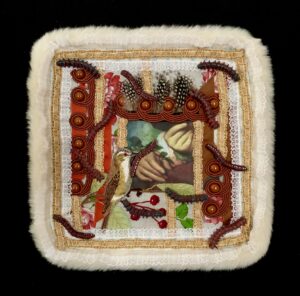
K Johnson Bowles A Little Bird Told Me (Shaming) 2019, mixed media assemblage
16” x 16” x 1”.
Those questions were the beginning of Veronica’s Cloths, an account of trauma’s residue depicted via assemblages of vintage handkerchiefs, photographs, appliques, trims, notions, and a fantastic array of plastic insects, spiders, and snakes (among other things). While I am not religious per se, the series title takes its cue from the legend of St. Veronica, who wiped the face of Christ with her veil as he carried the cross of his crucifixion. Allegedly, the image of his face was left behind on the cloth – a miracle of compassion and transference of pain.
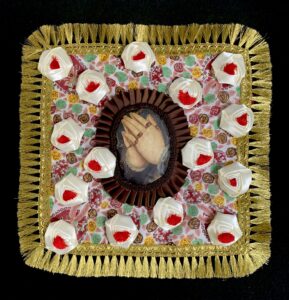
K Johnson Bowles Betrayal (Cowards) 2020, mixed media assemblage, 16” x 16” x 2”.
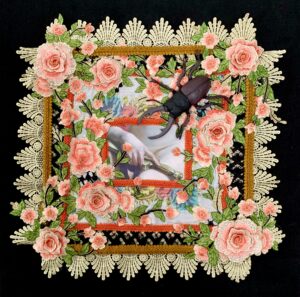
K Johnson Bowles Justice or Job (Stag Beetle) 2019, mixed media assemblage, 18” x 18” x 1”.
I love handkerchiefs. Seeking them out during journeys through antique stores, I get lost sifting through a basket of them craving the most vivid, finely embroidered, or meticulously tatted edges. In my mind’s eye, I conjure my mother painstakingly embellishing a crisp white piece of fabric to be given as a gift. I recall my mother and grandmother having handkerchiefs at the ready in a purse or the cuff of a blouse (or even tucked under a bra strap) to wipe a tear or to tidy a nose.
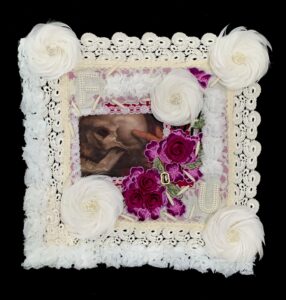
K Johnson Bowles Positive/Negative Self-Talk (For Melissa) 2019, mixed media assemblage, 18” x 18” x 2”.
There is a poignant irony in a beautiful, sweetly colored, flowered piece of fabric being used to absorb sadness and pain. Its purpose destroys it, soils it, and makes it disgusting. And, then, over and over again, the object is put through a ritualistic cycle of careful cleaning and ironing only to be soiled once again. Even the act of bringing the fabric to one’s face is a private ritual like meditation. One looks into a mesmerizing kaleidoscope of color and symmetry. Images on the fabric’s surface come in and out of focus through blurry tears. The experience is a relief, grounding one in the present. It catches the ugly residue of what was once in an anguished mind.
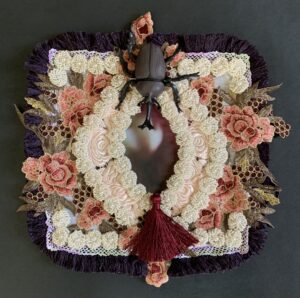
K Johnson Bowles Pushed Off the Glass Cliff 2020, mixed media assemblage, 16” x 16” x 1”.
Similarly, each of the works in Veronica’s Cloths is a meditation, a ritual, a reservoir, and an uncanny valley. I get lost in eye-searing color, obsessive patterns, and incongruous textures used to encrust the handkerchief’s surface. I’m startled and repulsed by the ants, spiders, scorpions, and snakes writhing on the surface. Juxtaposing materials associated with maternal tenderness side-by-side items evoking terror and phobia conveys the cycle of compassion and transference of trauma. I destroy and reveal the surface over and over to make my panoply of emotions visible.
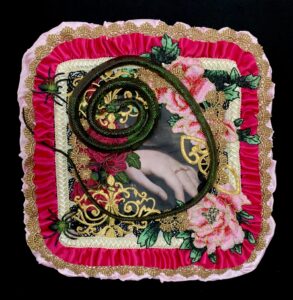
K Johnson Bowles Safe/Unsafe (Deceptions) 2019, mixed media assemblage, 16” x 16” x 1”.
Peaking through the surface’s visual melee are photographic images heat transferred on to the handkerchief. These are images I’ve taken on trips to museums and in my garden. In museums, I photograph snippets of paintings, more specifically, hands implying a narrative and action. They signify how events are often recalled, and emotions are triggered for the traumatized. The photographs of blurry flowers are from my gardens and represent an inability to see beauty and experience joy, and feeling lost in a void.
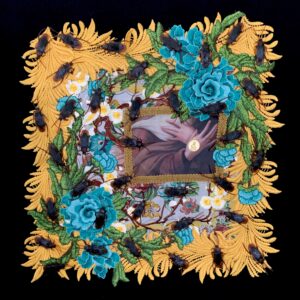
K Johnson Bowles St. Catherine and the Cockroaches (For Sarah) 2019, mixed media assemblage, 18” x 18” x 1”.
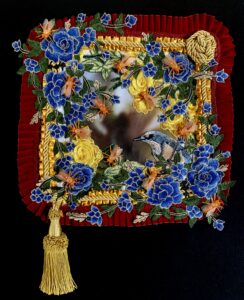
K Johnson Bowles Suicide Watch (Forget Me Not) 2020, mixed media assemblage, 20” x 16” x 2”.
Occasionally, I include letters and words in the works to indicate the dialogue between object and owner like a monogram, title Mother, or name. However, it isn’t that specific or formalist. The images, words, and title of the pieces create conversations, as well as between the viewer and me, taking us on a non-linear journey of symbols, meaning, and thoughts on experience. Sometimes the titles I assign artworks are a play on words (or references to slang, truisms, adages, aphorisms, idioms, gnomes, hyperbole). Sometimes the titles point to narratives in myths, legends, folklore, and historical events–metaphors and lessons. For me, the titles of my works (and use of letters and words in the works) nod at illuminated manuscripts and the use of word ribbons or ‘banderoles’ in Renaissance period art, pointing to a narrative.
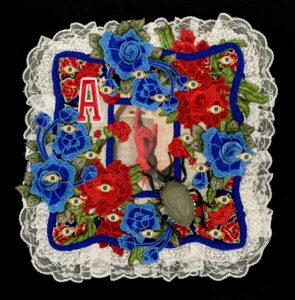
K Johnson Bowles The Stink of Righteousness 2020, mixed media assemblage, 16” x 16” x 1”.
These thoughts here only delve into the significance of materials and the process of creating Veronica’s Cloths. Each piece in the series conveys an aspect of trauma and its impact, which is meant to be both specific and universal. While cathartic to me, I hope it will be to others as well.
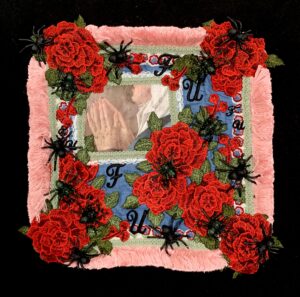
K Johnson Bowles You and Your Prayers 2019, mixed media assemblage, 16” x 16” x 1”.
To see more of the work and other blogs about Veronica’s Cloths go here. Also see the on-line solo exhibition of Veronica’s Cloths May 29 through July 31, 2020 at PH Gallery (Troy, New York, US).



11 Comments
future akins says
May 29, 2020 at 6:31 am
beautifully haunting...thank you so much for sharing I hope the pain slowly leaves only a scar and not an open wound
Gail Smuda says
May 29, 2020 at 6:43 am
Amazing work.
Kate webster says
May 29, 2020 at 6:56 am
I love these works. As an artist, I admire the execution, composition and textural variety of the compositions. The materials used are just fabulous! As a human, no matter the artist’s intent (which, by the way, I find quite compelling), I appreciate the juxtaposition of the Beautiful textiles and repulsive insects........the feeling of horror and appreciation at the same time. That’s how I feel generally about religion.
Barbara Mallon says
May 29, 2020 at 1:28 pm
Wow - I felt what you have (are) going through - exorcising the pain and rage while remaining tethered to your core self. This reached me. Thank you!
Joyce Marder says
May 30, 2020 at 6:48 am
Paragraph one precisely describes my workplace experience, which is why being retired was my ultimate life goal. The current state of cancellation and isolation has made it ever more difficult to block out negative memories with pleasant and mentally engaging activities. I try to do so by tatting and quilting. I am left to wonder if your marvelous creations have had the desired effect.
CJ says
July 5, 2020 at 12:22 pm
Wild and wonderful work—engages visually as well as historically with violence with a clever sense of humor.
Marcus says
July 5, 2020 at 2:39 pm
This article is as empowering as your art. Beautifully touching and resilient, it’s incredible how you managed to convey so much through images and textiles. The vibrant colors, the emotions surrounding the imagery you used. Handkerchiefs are so delicate and yet I can see nothing but strength in these pieces. This is incredibly cathartic, thank you.
Fae says
July 5, 2020 at 5:47 pm
What a beautiful and deeply moving project.
Jonathan Peel says
July 28, 2020 at 6:37 am
Thank you for sharing this experience with us - I hope that you are able to find continued peace through this work.
David Sale says
July 31, 2020 at 4:20 pm
Amazing writing and I admire your strength. I am very sorry that you have experienced this illegal harassment and assault. Those who did this to you should be brought to justice and removed from their positions at your previous employer.
Laura Poe says
August 8, 2020 at 7:50 pm
Lovely art and writing. Thank you so much for sharing so much with us.
Related Blog Articles
Assemblage
“Stockyards Gallery First Annual Fiber Art Exhibit” by Mary Elmusa
Assemblage
Member Spotlight: Myrna Tatar
No Thumbnail Available
Assemblage
Confluence Conference Workshop: Jennifer Reis & Embellished Textile Assemblage